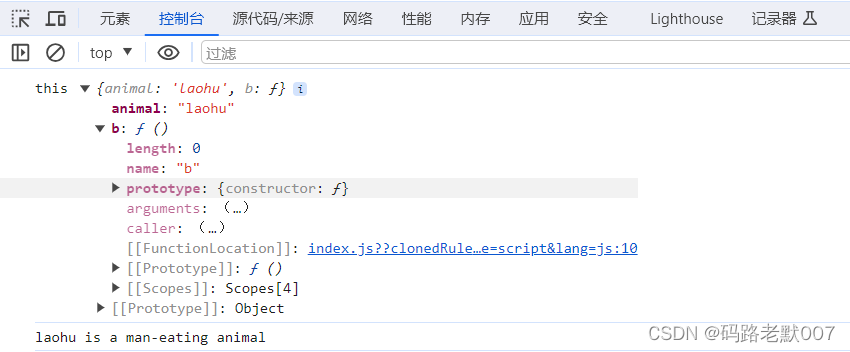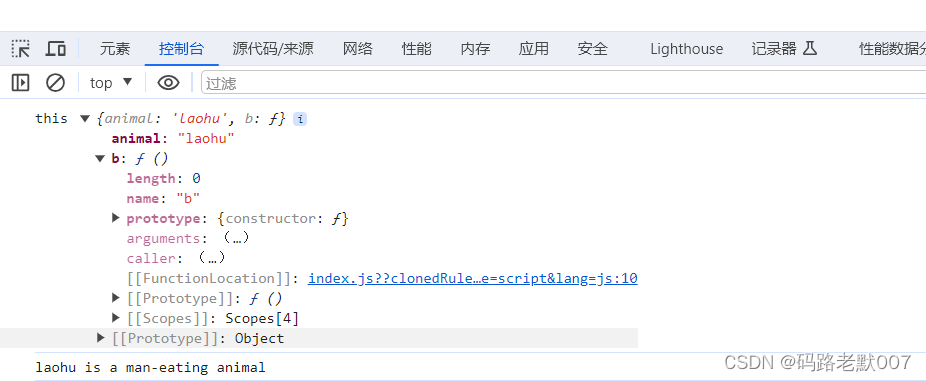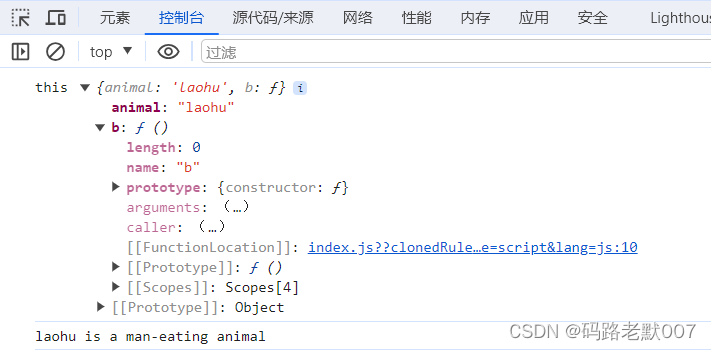改变this指向的三种方式
发布时间:2024年01月12日
题记:为什么我们要使用改变this指向?
? ? ? ? 我们思考一下,我们往往获取值的方式有下边几种情况,比如自己声明,另外就是通过原型链去找对吗,但是如果你又没有声明,原型链上有没有,那么怎么办呢?就偷,改变this其实就是把其他家的钥匙拿到,取别人的东西。
call()
function.call(thisArg, 参数1, 参数2, 参数3…)
function: 要改变this指向的原函数
thisArg: 要改变到的this指向的目标对象
function fn(animal) {
this.animal = animal
console.log('this', this)
this.b()
}
const obj = {
animal:'tiger',
b: function() {
console.log(`${this.animal} is a man-eating animal`)
}
}
fn.call(obj,'laohu')?
apply()
function.apply(thisArg, [参数1, 参数2, 参数3…])
function: 要改变this指向的原函数
thisArg: 要改变到的this指向的目标对象
function fn(animal) {
this.animal = animal
console.log('this', this)
this.b()
}
const obj = {
animal:'tiger',
b: function() {
console.log(`${this.animal} is a man-eating animal`)
}
}
fn.apply(obj,['laohu']) ?
?
bind()
funtion.bind(thisArg, 参数1, 参数2, 参数3…)
function: 要改变this指向的原函数
thisArg: 要改变到的this指向的目标对象
该方法并不会调用函数,仅仅改变了this指向
?
function fn(animal) {
this.animal = animal
console.log('this', this)
this.b()
}
const obj = {
animal:'tiger',
b: function() {
console.log(`${this.animal} is a man-eating animal`)
}
}
let fnn = fn.bind(obj,'laohu')
fnn()
总结:我们可以看到三个方法都得到了相应的结果,但是我们需要思考两件事,为什么要弄三个?另外就是三个代码书写都什么不同吗?
不同之处:
参数不同:1、apply()的参数是数组形式,可调用 ;2、bind()返回的是一个函数,需要再次调用才行。
我们再想一想,bind()的使用场景就是我们有的时候需要更换this,但是又不想调用,这个不就好了吗?
另外我们常常继承用call,apply经常和数组有关系,比如想用Math里边的函数等等!!!
寄语:
临近新年,希望各位大佬家庭和睦,家人健康,工作顺利。
文章来源:https://blog.csdn.net/2201_75705263/article/details/135545932
本文来自互联网用户投稿,该文观点仅代表作者本人,不代表本站立场。本站仅提供信息存储空间服务,不拥有所有权,不承担相关法律责任。 如若内容造成侵权/违法违规/事实不符,请联系我的编程经验分享网邮箱:chenni525@qq.com进行投诉反馈,一经查实,立即删除!
本文来自互联网用户投稿,该文观点仅代表作者本人,不代表本站立场。本站仅提供信息存储空间服务,不拥有所有权,不承担相关法律责任。 如若内容造成侵权/违法违规/事实不符,请联系我的编程经验分享网邮箱:chenni525@qq.com进行投诉反馈,一经查实,立即删除!